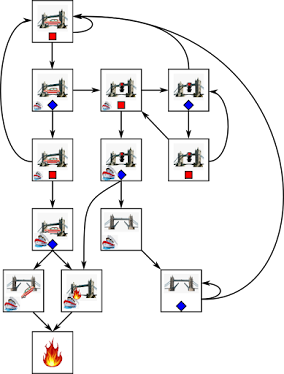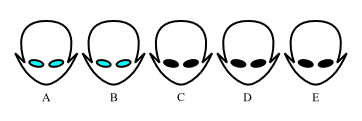Translation -- not betrayal but examination
I like to think that people who see me post on CritiqueCircle would be surprised to learn English is my second language. I would boast even more -- I think in English, though, perhaps, this is less surprising since the language I interact with most in my profession, and for a good portion of my leisure time, is English. At some point thoughts themselves will start following its haggard strings of consonants.
I think my boast is based on truth, but even so, or rather because of this belief, I found cause for surprise in a little translation I undertook recently.
I had watched a video from The Distributist several times over the past year or so, a bit more in recent times. The video itself deserves a post or two to discuss, but this is not that post. Sufficient to say, I found it an interesting, but very "American" perspective on things. What would someone who had lived under communism think of it? What would my father think of it? But of course here was the problem: the video is in English, which my father does not speak.
So I translated it. And in the process, got to look at its text with a fresh pair of eyes I didn't realize were available.
Some things about translation, especially of a video to a written text, are fairly trivial. There are many places where, in my estimation, The Distributist uses three-four sentences, all close together, to say the same thing. This works, maybe is even needed, for a spoken presentation where a certain rhythm of rhetoric is expected, and maybe some guardrails too, to keep the listener aware of what is said. In a written text that can be reviewed at one's leisure, the musical repetition of the preacher becomes a broken record you switch off. So, wherever I judged such trivial repetition to occur, I edited with no mercy.
But the really interesting thing happened with the sentences I didn't cut out. Laid bare in a direct translation, I discovered they would often, simply, not fit well together: imagery would weaken each other, meanings would clash, sometimes to the point of contradiction. The video, as I had heard it before and many times too, seemed to me to be coherent, and yet here I was, pondering how to put down sentences that would, unambiguously, make sense as a whole. This is not a humorous video, by the way -- although there are a few pieces of wit here and there --, nor is it poetry. It is a bare presentation of an argument.
The easy out is to think that the argument, that the narrative is incoherent. It is flawed as all arguments and narratives are, of course, but no, I don't think incoherence is among its flaws. Rather, having to write down, and in a different language, what it is saying made me aware of something I -- and probably you too -- do all the time. We don't take things as they are. We make them fit.
This is good conversational practice. It would be rather childish to play gotcha games on a too literal interpretation of someone's words. We understand that things are complex. We understand that people sometimes misspeak. And, unless we have some stake in proving who's Winning(TM) in an argument, we make the assumption that the person talking has an idea behind their words. We do our best to look through second and third meanings of those words, and through the networks of suggestions they invoke, to construct the best possible, the most charitable interpretation of what is being said.
This process hits a roadblock when the language you must render an idea in does not have words with the same set of second- and third meanings, with the same networks of suggestion. The habit of charitable interpretation creaks to a halt, and as often happens when habits stop abruptly, consciousness is called in to make sense of the mess. Of course I knew, at some level, that communication is a multi-author process even when only one person speaks. I study language after all. But it is one thing to know with words, and another to know with the heart, and I needed to translate to really know how much of the heavy lifting I the listener am doing when constructing even something so allegedly clear as an argument spoken by someone else.
Perhaps inspired by some hypothesis about how language shapes thought, some pub philosopher once speculated that native Americans could not see Columbus' ships. I think such ideas are bullshit when understood literally. Within some very large limits, you can express anything into any language. But perhaps in a weaker sense there is a bit of truth to the pub philosopher's idea. I wonder now how it must have felt for the Jesuit missionaries who learned the languages of the Americas, and of other places, to then translate the Bible and preach its teachings. It's not about the grammar. It's that words call on other words, even when the other words are not spoken. It's that these associations seem natural to us. It is that these associations, in fact, are not natural to someone else.
And so, with the fresh eyes of a stranger, you get to look upon yourself.


Yes. Taken individually, words can (usually) be translated into a word or phrase in another language. But words carry a whole constellation of cultural meaning with them that has its own chemistry when strung into sentences and paragraphs. That simply does not translate literally.
ReplyDeleteOne of the early computer translation programs took the phrase "Out of sight, out of mind", translated it into (I think) Russian then back into English. It came back with "Invisible idiot". A reasonable literal interpretation, but entirely lacking the original meaning.
Hah! "Invisible idiot", that's a good one. There was a website that would apply successive translations from English through various languages then back again, to humorous results. I would say this is not necessarily indicative of a fault in the program (that can be proven by a single translation step, lol), but rather that translation is a bit of a game of Chinese whispers.
DeleteThis eerie, ineffable quality of meanings that stick together may in fact be why current approaches to machine translation are a lot more "airy", statistical, or hidden in a thicket of artificial neural networks, than the rule based approaches of old.
Hah, but that seems a topic for another post, some other time.
Cheers!